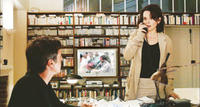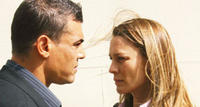 Michael Haneke, a sometimes enfant terrible of European cinema, has an extraordinary visual style: stark, unapologetic and lingering just long enough to capture something unexpected. He is reminiscent of that other master, Kubrick, who legendarily made actors perform things over and over until a new version of what they were doing emerged. In Cache (Hidden), which won the director’s prize at Cannes this year, he has created a truly frightening combination of these qualities in order to comment on society’s obssession with privacy and the invasion thereof. A successful television host (this kind of character is popular - see Mary, also starring Juliette Binoche) is plagued by tapes delivered to his home, which make it clear that he is being watched. The tapes are accompanied by violent drawings. Things escalate and his son disappears. But I won’t go any further.
Michael Haneke, a sometimes enfant terrible of European cinema, has an extraordinary visual style: stark, unapologetic and lingering just long enough to capture something unexpected. He is reminiscent of that other master, Kubrick, who legendarily made actors perform things over and over until a new version of what they were doing emerged. In Cache (Hidden), which won the director’s prize at Cannes this year, he has created a truly frightening combination of these qualities in order to comment on society’s obssession with privacy and the invasion thereof. A successful television host (this kind of character is popular - see Mary, also starring Juliette Binoche) is plagued by tapes delivered to his home, which make it clear that he is being watched. The tapes are accompanied by violent drawings. Things escalate and his son disappears. But I won’t go any further. The opening image of this brilliant piece is the exterior street and the house of our heros, held for an extended period of time. One shot. People come and go. Even one of our characters exists and walks away and still the camera does not move and we do not cut. Instead, all of a sudden the image freezes, and is rewound, making it clear that what we have been watching is in fact a tape. It’s a powerful way to draw us into the heart of this film’s complexities. Daniel Auteuil and Juliette Binoche become increasingly tormented and the strain pulls the marriage apart. The twists and turns take us into alarming territory and we are never certain if what we are watching is the action of the film or recorded action within the film. This is a cineaste’s dream: where the static camera records with objectivity what the moving camera can only suddenly explain. Not to be missed.
 Strange twists and turns were also the order of Jeff Stanzler’s Sorry Haters, a strange American indie about a New York woman who hails a cab driven by a Syrian immigrant and commences an uneasy relationship that lasts more than 24 hours. By turns taut, harrowing and deeply disturbing, the story points reveal to us slowly a very diseased psyche, disguising itself in society with apparent ease. Breathtaking performances by Robin Wright Penn and Abdellatif Kechiche do not, however, completely sell the film, which is meant to be an ode to the chaos of trust and prejudice extant in a post-9/11 society. The hairpin turns on character are hard to take in stride with the speed at which we are asked to digest them. I left the cinema deeply affected but not necessarily impressed. Still under consideration.
Strange twists and turns were also the order of Jeff Stanzler’s Sorry Haters, a strange American indie about a New York woman who hails a cab driven by a Syrian immigrant and commences an uneasy relationship that lasts more than 24 hours. By turns taut, harrowing and deeply disturbing, the story points reveal to us slowly a very diseased psyche, disguising itself in society with apparent ease. Breathtaking performances by Robin Wright Penn and Abdellatif Kechiche do not, however, completely sell the film, which is meant to be an ode to the chaos of trust and prejudice extant in a post-9/11 society. The hairpin turns on character are hard to take in stride with the speed at which we are asked to digest them. I left the cinema deeply affected but not necessarily impressed. Still under consideration.Another ‘half hour’ experience of Sunday was one of timetabling, not achievement. As part of the Canadian retrospective on the work of Don Owen, a number of his films have been screened. The one that slid into my available slot was Snow In Venice, a profile of that Wavelength genius Michael Snow, as he prepares for the Venice Bienalle in 1971. More amusing than the deep throated voiceover classic to CBC projects of the period, is the strange waifish simplicity of Snow himself, creating an art installation while killing time in the city of canals, by tossing his locks and photographing himself with great monuments behind him on a polaroid camera. This silliness becomes just plain funny and Owen treats it exactly so. There is no attempt to make it sober or profound. The real revelation here, however, is Joyce Wieland,the “Mrs. Snow” referred to in the voiceover. A great artist in her own right, and equally as deserving of the mantle of celebrity, she is nonetheless relegated here to helping her husband line himself up with the Bridge of Sighs. Thank god this was the decade of feminism! or we might still know her only in these terms. There is one lovely passage, however, in which she talks about the witnesses to great works of history, like Madame de Stael, while sitting in a breezy chair, tossing her own great black locks out of her face as Venice echoes behind her. These are the kinds of gems that float out of an open vault.
No comments:
Post a Comment